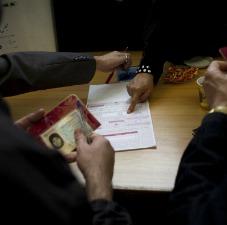BROOKE GLADSTONE: From WNYC in New York, this is On the Media. I’m Brooke Gladstone.
BOB GARFIELD: And I’m Bob Garfield. This week Iranians returned to the polls for the first time since 2009’s presidential election, widely believed to have been rigged, sparked massive protests that were crushed by the government. In Friday’s parliamentary vote, the leadership offered citizens a choice between hard line and harder-line candidates.
But the electorate’s most crucial decision was whether to vote at all. Opposition groups and reformers have called for a boycott of the elections, but the government pressured citizens to vote to show the world that they believe in Iran’s political process.
As we’re recording this on Friday, the government has claimed, quote, “massive turnout” while foreign journalists in Iran report meager numbers at the polls - this despite heavy restrictions on where media could go and to whom they could talk on election day.
Muhammad Sahimi covers Iran for the Tehran Bureau blog. He told us that citizens who declined to vote would not be able to hide from that decision.
MUHAMMAD SAHIMI: When Iranians go to polling stations they carry a birth certificate of several pages, and the last page of that birth certificate is a stamp that indicates that this person actually voted on March 2nd 2012. So when later on they go, for example, to a government organization and ask for something or when their management where they work summon them to prove that they have voted, they can check their birth certificate and see whether they have actually voted or not.
But at the same time, of course, there is a very large segment of the population that does not deal with the government directly in this way or is willing to accept the risk and not go to polling stations.
BOB GARFIELD: So in this contest within a contest, the government is employing media in various ways. Let’s start with what the state-controlled media are doing.
MUHAMMAD SAHIMI: Oh, the state-controlled media are saying all the right things. They are saying that people are excited to vote. They are using all sorts of patriotic writings, songs, speeches and so on to excite people to go to vote. They are also trying to tell to people that if you do vote, then the national security of the country will be protected because foreign powers know that the majority of people still support this regime. And if you don’t vote, you are actually siding with the enemy.
The other thing that the government has been doing is publishing or broadcasting messages from conservative ayatollahs that support the government, saying that if they don’t vote when their country is facing all sorts of difficult problems, both domestically and at the international level, would be a sin.
BOB GARFIELD: Now, on the presumption that the government will misstate the turnout figures, various dissidents are attempting to document what they presume will be a much lower participation. How are they doing that?
MUHAMMAD SAHIMI: A lot of people report on their blogs what they have seen. Social networks inform people of what’s going on around large cities, particularly Tehran. And there are huge mailing lists by many groups, that contains tens of thousands of people, urging people to send their observations of what’s going on around their neighborhood in polling stations. You know, the accumulated effect of all these efforts can provide a reasonable estimate of what the turnout – the actual turnout – in large cities are, as opposed to what the government may declare.
One thing that I should point out is that, at least in Iran there has always been a very important difference between presidential election and parliamentary elections, in which the issues are totally local. If people, even in these elections, still turn out on their own will and vote, most analysts and political observers in Iran do not really interpret it as the legitimacy of the regime, simply because in these elections every issue is a local issue and people care about their local needs with which they have been grappling.
At the same time, the opposition also cares about the turnout because they have called on people to boycott the election.
BOB GARFIELD: So it isn’t that the regime thinks it can fool the West into proving its legitimacy, so much as that it’s trying to not allow the opposition to prove to the West that it is not under heel?
MUHAMMAD SAHIMI: Well, it is both because the regime wants two things: to prove that the opposition does not have so much sway that it can call on people not to vote and people will heed their call for not voting. This is domestic. And, at the same time, it wants to show to the outside world that the opposition forces in Iran are not as legitimate and as powerful that the outside world thinks. If they can somehow show that the majority of people did not heed their call for boycotting the elections, then that by itself is a victory of some sort for the regime.
BOB GARFIELD: Muhammad, thank you so much.
MUHAMMAD SAHIMI: Thank you for having me on your program.
BOB GARFIELD: Muhammad Sahimi covers Iran for the website pbs/frontline/tehranbureau.
